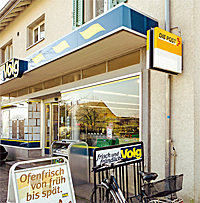
Swiss Post: At the Physical and Digital Interface
Mail & Express Review Editor John Modd talks to Jürg Bucher, CEO of Swiss Post, which is hosting this year’s World Mail & Express Europe conference and exhibition in Geneva between 21st and 23rd May. Swiss Post is one of the most successful posts in Europe, with an enviable record of strategic diversification in Switzerland and abroad.
In 2010 it had revenues of CHF 8.7bn (1CHF: 1.23Euro at the time of writing.) On these revenues it achieved an operating income of CHF 930m or over 10%. It handled some 2.4bn letters in 2010 (down from 2.8bn in 2006) and 108m parcels (104m 2006).
Jürg Bucher joined Swiss Post and Telecom in 1985, initially in the finance function. He moved into line management in 1994, with roles in both the postal business and PostFinance. He became a member of the Executive Board in 2003 and was appointed CEO in December 2009. Bucher will retire as CEO this September.
The interview began with discussion of the position of Swiss Post as an autonomous public enterprise owned by the Swiss Confederation, and of the new regulatory authority, PostCom, set up by a new postal reform law.
With current standards of postal services good, and Swiss Post profitable, Bucher said for the time being, the definition of basic universal services is not an issue in Switzerland. However, he said in the long term, his company would need to keep a close eye on how customers’ communication needs are changing.
At some point, there may be a need to take a fresh look at the definition of the universal service, alternative delivery formats, or how Swiss Post is financed, he said.
John Modd: What are the key challenges for Swiss Post over the next few years?
Bucher: In my opinion, five trends are currently impacting on the postal sector: changing customer needs, digitisation, sustainability, globalisation and deregulation. Increasing complexity is fuelling the demand from customers for simple solutions, hand in hand with greater emphasis on traditional values such as quality, reliability and security.
The traditional physical postal and payment transaction services have in many areas come under pressure from new digital alternatives such as e-mail, text messaging, e-banking and social media. As natural resources become scarcer, customers, investors and legislators alike are becoming more aware of sustainability issues. Globalisation is intensifying the pressure on the posts to become increasingly internationally oriented and to specifically offset disadvantages in size or geographic distance through cooperative ventures.
Finally, in a deregulated market, the challenge is to create the conditions that will make it possible to continue to safeguard a high quality, self financing basic service.
Swiss Post is pursuing several strategic objectives. We are constantly working on ways of offering customers first class and innovative services. At the same time those services have to be offered at prices appropriate to the market. Here, cost control plays an important role. All in all, it is a matter of finding a balance between cost efficiency, sustainable and profitable growth, and high quality of service at fair, market oriented prices.
Modd: Let’s talk about the future for physical letters. Swiss Post has seen volume decline, like almost everyone else. For how much longer will this be a core business?
Bucher: We firmly believe that the letters business will continue to be a core business. The letter will have a clear and strong position in the communication market. I believe that the letter will be a premium product and will remain an attractive means of communication.
As a direct marketing tool, the letter offers many advantages. It is more durable; a personal letter makes the recipient feel valued; the probability that the information will actually reach the recipient is very high; and there is the possibility of sending items of intrinsic value with the information, for example.
Therefore we intend to continue investing heavily in the letters business by further optimising our services, making our processes as efficient as possible and exploiting new opportunities for growth. This includes developing innovative solutions and offers at the interface between the physical and electronic worlds.
The future of the postal industry will be hybrid. Just as customers live in parallel worlds, so posts will have to have both a physical and an electronic presence in the future.
Modd: I believe Swiss Post is doing some interesting things at that interface.
Bucher: Our Swiss Post Solutions unit is converting physical mail into electronic data or generating printed output from digital information, complementing these services with billing and a variety of customer dialogue solutions.
These include, for example, in house postal services and document management for large companies. In this way letters can be handed in, electronically archived and delivered in either e-mail or letter form as the customer prefers. The “Swiss Post Box” digital mailbox enables people who are on the road a lot to receive their physical mail on mobile phone or laptop. Staff scan the envelope and send it electronically to the customer, who decides whether to receive the contents electronically.
To ensure that Swiss Post stays at the forefront of technological developments, we have created the ePost Product House within Swiss Post Solutions. This centre of excellence drives development work forward with the aim of exploiting the potential of electronic solutions for the various Group units. These include the secure and verifiable sending of confidential e-mails, e-government and e-health, and e-commerce. We have also begun to sell white label products to other postal operators
Modd: Looking at Swiss Post’s activities in the parcels sector, how important is e-commerce in growing volumes? What about your partnerships?
Bucher: E-commerce is an important growth market for Swiss Post. We already offer individual delivery points and times with our PickPost service. We also deliver e-commerce consignments between 5 and 8 p.m. We are selectively developing new services in this area.
We are involved in a joint venture with TNT which enables us to offer our export customers attractive international courier services. We have a partnership with GLS where we sell export parcel solutions to our customers in Switzerland on an exclusive basis.
We also clear the parcels from the GLS network and deliver them using our own distribution network.

Modd: Can you tell us something about the evolution and the range of services on offer in the retail network?
Bucher: The network of post offices was built as a supply network, not a distribution network.
The development of the network since 1997 has been dominated by cost reductions through converting or closing post offices, and by the development of additional lines of business to reduce deficits. In the past, the conversion of the post office network was handled on a project basis.
Between 2001 and 2005, for instance, around 900 small post offices in rural areas were replaced with a home delivery service. As part of the urban networks project, between 2003 and 2005 around fifty post offices were closed in the seventeen largest cities in Switzerland.
Since 2007, a steady stream of small post offices has been converted to a home delivery service or agencies. This system of agencies and home delivery services enables us to offer an economical and customer friendly alternative to small post offices. The conversion of the post office network remains an ongoing imperative.
The first third-party products we introduced were lottery items, tax discs and tax cards for telephone calls. In addition, we have always sold the products of PostFinance (payments, investments, savings) or acquired customers for PostFinance. As a need developed for additional products, we gradually expanded our range.
Today, we use hitherto underused floor space in the counter area to sell third party products. Our sales figures (current turnover of around CHF500m) illustrate that our customers value our range.
Modd: How do you offer services to retail customers?
Bucher: We use three channels for sales: the conventional post office, the e-shop and home delivery. The decision as to which products are sold through which channel is made on an individual basis, depending on the product and demand.
Post offices remain the main sales channel. Initially, the product line up for the online e-shop was guided by the basic principle of supplementing the existing product range with complementary products. For example, mobile phones are sold at post offices and the related accessories at PostShop Online. Home delivery was launched in 2007.
The customer comes to the post office and orders and pays for the product which is then delivered to the customer’s delivery address. This new sales channel combines the wide choice offered by online selling with the personal customer contact afforded by a physical point of sale, and directly addresses the needs of the traditional customer.
Bucher will be retiring as CEO in September, and will be replaced by Susanne Ruoff, the Chief Executive of BT in Switzerland. Her appointment reinforces the strategy outlined in this interview: “Swiss Post… wants to continue implementing its strategy of connecting the physical with the electronic postal world in a targeted manner”.
This abridged interview with Swiss Post CEO Jürg Bucher appears unabridged within the March 2012 edition of Mail & Express Review, the quarterly magazine and sister title of Post&Parcel. Click here for subscription details »









